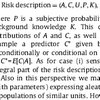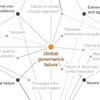 Albeit many supply chains make use of more than one, if not all modes of transport, the vulnerability of the transportation network is of particular interest in countries or regions with sparsely populated areas, and hence, a sparse transportation network, often with only one mode of transportation available between population centers, meaning this centre can only be reached by either rail, sea, air or road. Having basically only one transportation link to the aforementioned population centers, it becomes extremely vulnerable to any disruption in the transportation system or supply chain, since in a possible worst-case scenario no suitable alternative exists.
Albeit many supply chains make use of more than one, if not all modes of transport, the vulnerability of the transportation network is of particular interest in countries or regions with sparsely populated areas, and hence, a sparse transportation network, often with only one mode of transportation available between population centers, meaning this centre can only be reached by either rail, sea, air or road. Having basically only one transportation link to the aforementioned population centers, it becomes extremely vulnerable to any disruption in the transportation system or supply chain, since in a possible worst-case scenario no suitable alternative exists.
PhD research
The question then arises, how do companies or businesses located in such places adapt to the terms and conditions of their supply chain, how do they hedge against the risk of supply chain disruptions, how are they impacted if there is a disruption, is it possible to put a price tag to this, and who is ultimately paying the price for these supply chain insecurities, the company or the customer?
This question is the topic for my ongoing PhD research that is currently carried out at Molde University College and aims at investigating how businesses adapt their supply chain management in unfavorable locations.
This research thus will attempt to quantify the cost a given business or company incurs, given its particular location in relation to its supply chain, and use this knowledge to assess favorable and unfavorable locations and what actions businesses can take to overcome locational disadvantages.
Research questions
- How do the potential disruptions impact the supply chain?
- What potential supply chain disruptions are considered within the business community as being important or worth preparing for?
- Does the location and organization of the supply chain reflect a preparedness for the disruptions? If yes, why so? If no, why so?
- What are the particular risks the company is exposed to?
- What level of preparedness (insurance) is the company willing to pay for?
Research cooperation
If this is of interest to you, and you would like to know more; if you would like to cooperate academically or professionally, please contact me.
Related
- husdal.com: Supply Chain Disruptions – Does location matter?
- husdal.com: TRB2009 – are you going there?
- husdal.com: Supply Chain Disruptions in Sparse Transportation Networks












